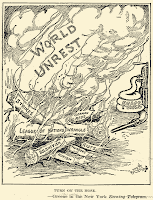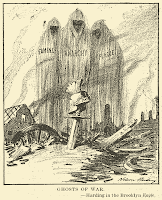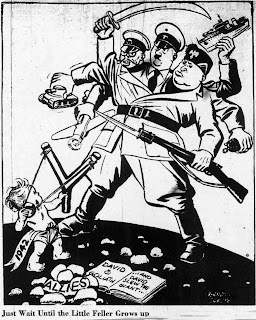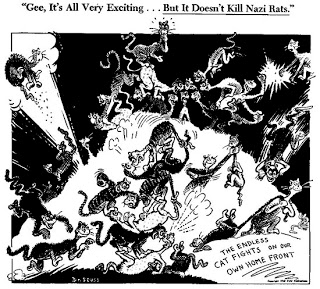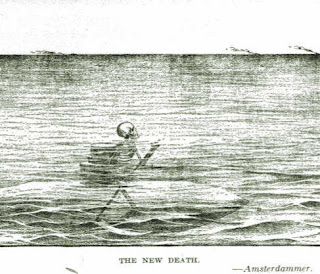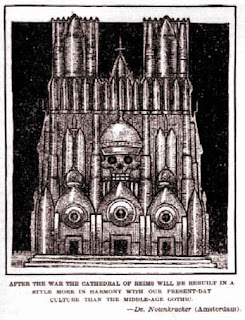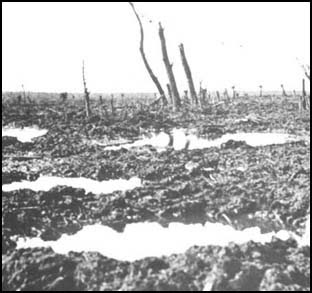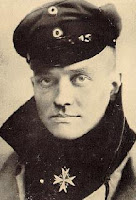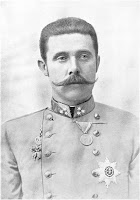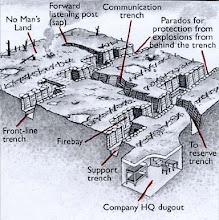Dear Mother,
I hope you are better. If you have written me I have not gotten your letters and so I am beginning to worry. Have you had your operation yet? Has father been able to pay for it? I wish I could help you but I am stuck here in the hell that is this war. We are losing Mother. We all know it. The reinforcements are few and far between and the enemy just keeps coming. We are being pushed back by an enemy that seems never-ending. I see my friends falling around me and I can do nothing to save them. Sometimes I am gripped with this unimaginable terror that I can do nothing but sit there and wait for it to pass.
The bombs keep falling and the men keep coming and I keep living. I have escaped death by a hairsbreadth countless times and I have gotten rather used to leaving a dugout to get some food and coming back to a smoldering ruin just in time to help shovel it out. I have become a living ghost. I feel as if I have been here for an eternity and there was no before and there will be no after. This war has ruined me and it is all I know. If peace ever does come I do not know if I will be able to function in a normal setting or if I will become a burden to whoever inherits me.
I hope this letter finds you well. I miss you and hope that you will continue to write me; perhaps I will actually receive them. Continue to pray for me, though I do not know if it will do any good for God seems to have abandoned us. No, that’s not true; I am still alive am I not? If you can truly call this miserable existence that I lead life. I hope to see you soon.
Your loving son,
Paul
Song of the Soldiers
by Charles G. Halpine
by Charles G. Halpine
Comrades known in marches many,
Comrades, tried in dangers many,
Comrades, bound by memories many,
Brothers let us be.
Wounds or sickness may divide us,
Marching orders may divide us,
But whatever fate betide us,
Brothers of the heart are we.
Comrades, known by faith the clearest,
Tried when death was near and nearest,
Bound we are by ties the dearest,
Brothers evermore to be.
And, if spared, and growing older,
Shoulder still in line with shoulder,
And with hearts no thrill the colder,
Brothers ever we shall be. By communion of the banner,
Crimson, white, and starry banner,
By the baptism of the banner,
Children of one Church are we.
Creed nor faction can divide us,
Race nor language can divide us
Still, whatever fate betide us,
Children of the flag are we.
In war the people you fight and die with eventually become closer to you than family. You survive together and lean on each other; you rescue each other and are rescued. Without your comrades you are nothing, but with them you have the potential to be everything. This poem really stresses the bond formed by soldiers when they go to war together. In the line, “But whatever fate betide us, Brothers of the heart are we,” Halpine concedes that they may fall and they may be separated, but no matter what happens, they will always be brothers because of what they have experienced together. Another line that reinforces this is, “Tried when death was near and nearest.” Soldiers must look out for one another and a true brother has been tried, meaning that he has in some way been selfless toward one of his comrades; he has risked something that is dear to him and done it without hesitating for one of his “brothers.” Without family what do you truly have? In war, your family is the soldiers you fight with, the ones you are out risking your life with, and without them, you probably wouldn’t survive.
 In war you do not abandon your comrades; you fight to save them just as they would have fought to save you. They are your brothers and you must stick together. This photograph really encompasses that ideal. It shows two men carrying their wounded comrade, they did not just leave him where he fell to die, they are doing whatever they can to help him stay alive because he is there comrade and they are bound by honor and duty to stick together and leave no man behind. Because there are two men carrying him instead of one it signifies the unity of the men who fight, it proves that the character of one man is not unique and that any other man in that army would have simply left the wounded soldier to die, it shows that the soldiers share the same beliefs and the desire to save as many of their comrades as possible. It also shows that the soldiers understand that without teamwork they will be destroyed. If the soldiers of an army simply left their wounded comrades to die without even attempting to save them it would not be an army, it would be a collection of men who have no hope of winning the war because they do not care about one another. They do not understand that if they leave everyone to die soon there will be no one left to save them and they too will fall as the army that was not an army slowly topples into the blood and dust of the battlefield.
In war you do not abandon your comrades; you fight to save them just as they would have fought to save you. They are your brothers and you must stick together. This photograph really encompasses that ideal. It shows two men carrying their wounded comrade, they did not just leave him where he fell to die, they are doing whatever they can to help him stay alive because he is there comrade and they are bound by honor and duty to stick together and leave no man behind. Because there are two men carrying him instead of one it signifies the unity of the men who fight, it proves that the character of one man is not unique and that any other man in that army would have simply left the wounded soldier to die, it shows that the soldiers share the same beliefs and the desire to save as many of their comrades as possible. It also shows that the soldiers understand that without teamwork they will be destroyed. If the soldiers of an army simply left their wounded comrades to die without even attempting to save them it would not be an army, it would be a collection of men who have no hope of winning the war because they do not care about one another. They do not understand that if they leave everyone to die soon there will be no one left to save them and they too will fall as the army that was not an army slowly topples into the blood and dust of the battlefield.